外研版初一英语时态专题复习
- 格式:doc
- 大小:73.00 KB
- 文档页数:9
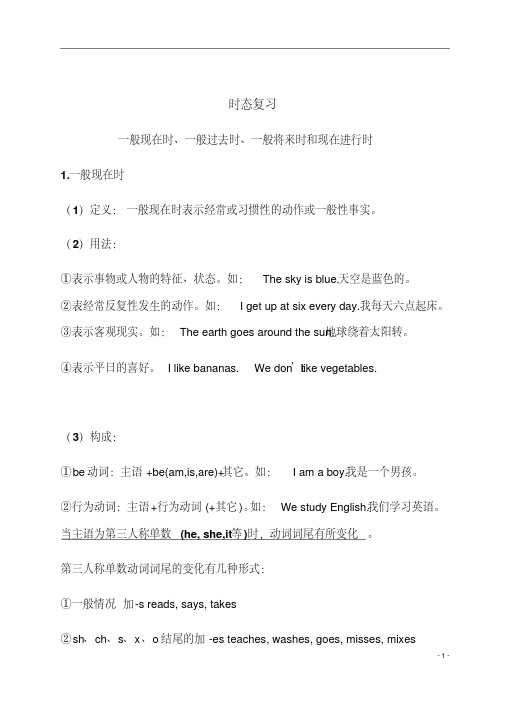
时态复习一般现在时、一般过去时、一般将来时和现在进行时1.一般现在时(1)定义:一般现在时表示经常或习惯性的动作或一般性事实。
(2)用法:①表示事物或人物的特征、状态。
如:The sky is blue.天空是蓝色的。
②表经常反复性发生的动作。
如:I get up at six every day.我每天六点起床。
③表示客观现实。
如:The earth goes around the sun.地球绕着太阳转。
④表示平日的喜好。
I like bananas. We don’t like vegetables.(3)构成:①be动词:主语+be(am,is,are)+其它。
如:I am a boy.我是一个男孩。
②行为动词:主语+行为动词(+其它)。
如:We study English.我们学习英语。
当主语为第三人称单数(he, she,it等)时,动词词尾有所变化。
第三人称单数动词词尾的变化有几种形式:①一般情况加-s reads, says, takes②sh、ch、s、x、o结尾的加-es teaches, washes, goes, misses, mixes③以辅音字母加y结尾的词变y为i再加-es studies, cries, carries如:Mary likes Chinese.玛丽喜欢汉语。
Miss Gu teaches us English. 顾老师教我们英语。
(4)句式变化:①be动词的变化。
否定句:主句+be+not+其它。
如:He is not a worker.他不是工人。
一般疑问句:Be+主语+其它。
如:-Are you a student? -Yes,I am. / No,I’m not.特殊疑问句:特殊疑问词+一般疑问句。
如:Where is my bike?②行为动词的变化。
否定句:主语+don’t(d oesn’t)+动词原形(+其它)。
如:I don’t like bread. 当主语为第三人称单数时,要用doesn’t构成否定句。
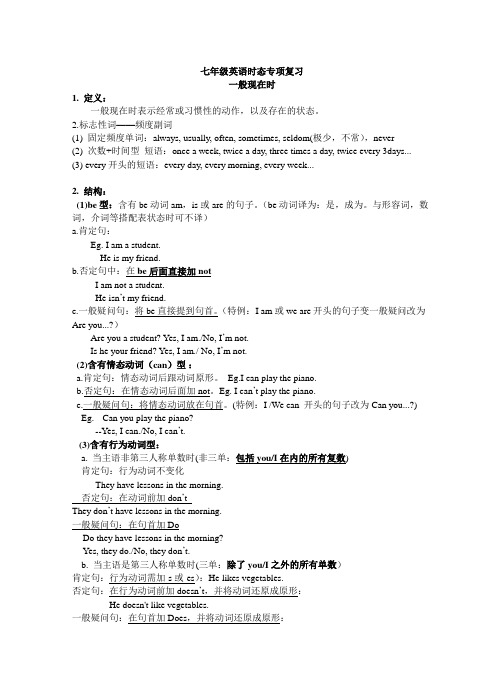
七年级英语时态专项复习一般现在时1. 定义:一般现在时表示经常或习惯性的动作,以及存在的状态。
2.标志性词——频度副词(1) 固定频度单词:always, usually, often, sometimes, seldom(极少,不常),never(2) 次数+时间型短语:once a week, twice a day, three times a day, twice every 3days...(3) every开头的短语:every day, every morning, every week...2. 结构:(1)be型:含有be动词am,is或are的句子。
(be动词译为:是,成为。
与形容词,数词,介词等搭配表状态时可不译)a.肯定句:Eg. I am a student.He is my friend.b.否定句中:在be后面直接加notI am not a student.He isn’t my friend.c.一般疑问句:将be直接提到句首。
(特例:I am或we are开头的句子变一般疑问改为Are you...?)Are you a student? Yes, I am./No, I’m not.Is he your friend? Yes, I am./ No, I’m not.(2)含有情态动词(can)型:a.肯定句:情态动词后跟动词原形。
Eg.I can play the piano.b.否定句:在情态动词后面加not。
Eg. I can’t play the piano.c.一般疑问句:将情态动词放在句首。
(特例:I /We can 开头的句子改为Can you...?) Eg. --Can you play the piano?--Yes, I can./No, I can’t.(3)含有行为动词型:a. 当主语非第三人称单数时(非三单:包括you/I在内的所有复数)肯定句:行为动词不变化They have lessons in the morning.否定句:在动词前加don’tThey don’t have lessons in the morning.一般疑问句:在句首加Do--Do they have lessons in the morning?--Yes, they do./No, they don’t.b. 当主语是第三人称单数时(三单:除了you/I之外的所有单数)肯定句:行为动词需加-s或-es):He likes vegetables.否定句:在行为动词前加doesn’t,并将动词还原成原形:He doesn't like vegetables.一般疑问句:在句首加Does,并将动词还原成原形:--Does he like vegetables? --Yes, he does/--No, he doesn't.)注意:表示客观真理,客观存在,科学事实,必须用一般现在时表达。

新版外研社七年级英语三种时态复习要点及巩固练习七年级三种时态复习要点及巩固练习一般现在时(一)定义:1)表示现在的状态;2)表示经常或习惯的动作;3)表示主语具备的性格爱好或能力.例如:My backpack is on the sofa.He plays soccer ball every day.My sister gets up at 6:00.My mother likes strawberries.She knows English.(二)标志性时间状语:always, usually, often, sometimes, every week (day, year,month…), once a week, on Sundays, etc.(三)一般现在时的构成:当谓语动词为be动词时:主语+ be(am /is / are)+其它.当谓语动词为行为动词时:主语+ 动词原形/ V-s/ V- es + 其它. (四)一般现在时的基本结构:1.当谓语动词为be动词时:主语+ be(am / is / are)+其它.肯定句:主语+ be(am / is / are)+其他否定句:主语+ be(am / is / are)+not+其他.(isn't /aren't )一般疑问句:Be(Am / Is /Are)+主语+其他+?特殊疑问句:特殊疑问词+ be(am /is / are)+主语+其他+?2.当谓语动词为行为动词时:主语是第三人称单数时:肯定句:主语+动词的第三人称单数+其他 He likes the apples . 否定句:主语+doesn't+动词原形+其他 He doesn't like theapples.一般疑问句: Does+主语+动词原形+其他+? Does he like the apples? 肯定回答: Yes,主语+does. Yes,he does.否定回答: No,主语+doesn't. No,he doesn't.特殊疑问句:特殊疑问词+一般疑问句 +? What does he like? 3.当谓语动词为行为动词时:主语不是第三人称单数时:肯定句:主语+动词原形+其他 I have a pen.否定句:主语+don't+动词原形+其他 I don't have a pen.一般疑问句: Do+主语+动词原形+其他+? Do you have a pen?肯定回答: Yes,主语+do. Yes,I do.否定回答: No,主语+don't. No,I don't.特殊疑问句:特殊疑问词+一般疑问句+? What do you have ? (五)动词的第三人称单数形式的变化规则(请用心记住新目标英语七年级教材上册PP97-98表格内容)第三人称单数作主语时,谓语动词用单数,其变化规则有:1.一般情况,在动词词尾加s;2.以字母s, x, ch, sh, o结尾的动词,加es;3.以e结尾的动词,加s;4.以辅音字母加y结尾的动词,先变y为i,再加es5.以元音字母加y结尾的动词,加s;6.特殊:have→has are→is现在进行时(一)定义:表示现在(说话瞬间)正在进行或发生的动作,也可表示当前一段时间内的活动或现阶段正在进行(二)标志性时间状语:now, listen! look! at this time, these days, etc.(三)构成: 主语+助动词be( am/ is / are / ) +动词-ing(现在分词)形式+其它。
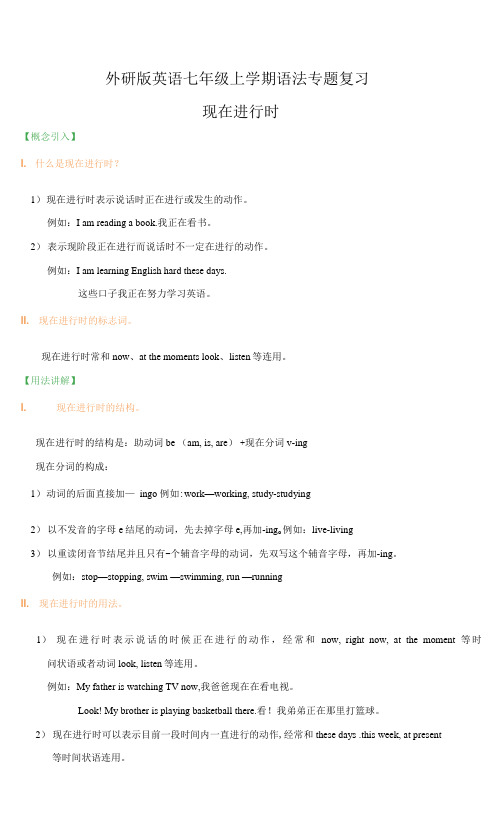
外研版英语七年级上学期语法专题复习现在进行时【概念引入】I. 什么是现在进行时?1)现在进行时表示说话时正在进行或发生的动作。
例如:I am reading a book.我正在看书。
2)表示现阶段正在进行而说话时不一定在进行的动作。
例如:I am learning English hard these days.这些口子我正在努力学习英语。
II. 现在进行时的标志词。
现在进行时常和now、at the moments look、listen等连用。
【用法讲解】I. 现在进行时的结构。
现在进行时的结构是:助动词be (am, is, are)+现在分词v-ing现在分词的构成:1)动词的后面直接加—ingo 例如:work—working, study-studying2)以不发音的字母e结尾的动词,先去掉字母e,再加-ing o例如:live-living3)以重读闭音节结尾并且只有-个辅音字母的动词,先双写这个辅音字母,再加-ing。
例如:stop—stopping, swim —swimming, run —runningII. 现在进行时的用法。
1)现在进行时表示说话的时候正在进行的动作,经常和now, right now, at the moment等时问状语或者动词look, listen等连用。
例如:My father is watching TV now,我爸爸现在在看电视。
Look! My brother is playing basketball there.看!我弟弟正在那里打篮球。
2)现在进行时可以表示目前一段时间内一直进行的动作,经常和these days .this week, at present 等时间状语连用。
例如:My parents are working on a farm these days.这些天我的父母在农场干活。
3)现在进行时还可以表示现在不断发展变化的小•情,表示不断发展变化的动词有get, grow,式。
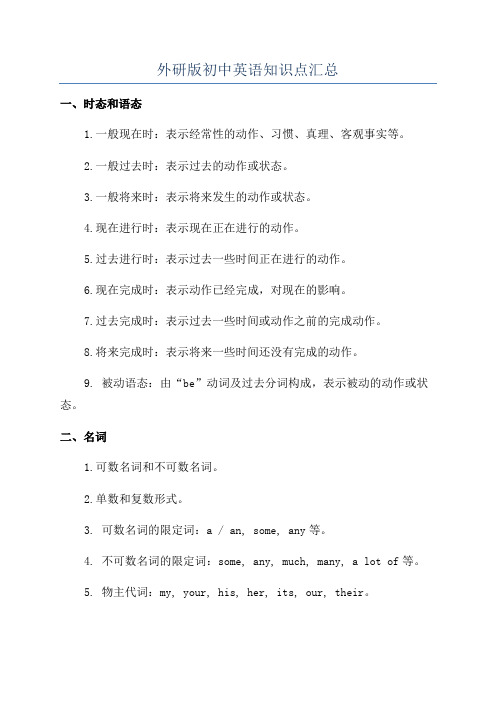
外研版初中英语知识点汇总一、时态和语态1.一般现在时:表示经常性的动作、习惯、真理、客观事实等。
2.一般过去时:表示过去的动作或状态。
3.一般将来时:表示将来发生的动作或状态。
4.现在进行时:表示现在正在进行的动作。
5.过去进行时:表示过去一些时间正在进行的动作。
6.现在完成时:表示动作已经完成,对现在的影响。
7.过去完成时:表示过去一些时间或动作之前的完成动作。
8.将来完成时:表示将来一些时间还没有完成的动作。
9. 被动语态:由“be”动词及过去分词构成,表示被动的动作或状态。
二、名词1.可数名词和不可数名词。
2.单数和复数形式。
3. 可数名词的限定词:a / an, some, any等。
4. 不可数名词的限定词:some, any, much, many, a lot of等。
5. 物主代词:my, your, his, her, its, our, their。
6. 不定代词:somebody, anybody, everybody, nobody, something, anything, everything, nothing等。
7.句子成分中的名词:主语、宾语、表语、定语等。
三、代词1. 主格和宾格代词:I, you, he, she, it, we, they。
2. 形容词性物主代词:my, your, his, her, its, our, their。
3. 名词性物主代词:mine, yours, his, hers, its, ours, theirs。
4. 反身代词:myself, yourself, himself, herself, itself, ourselves, yourselves, themselves。
5. 不定代词:somebody, anybody, everybody, nobody, someone, anyone, everyone, no one等。
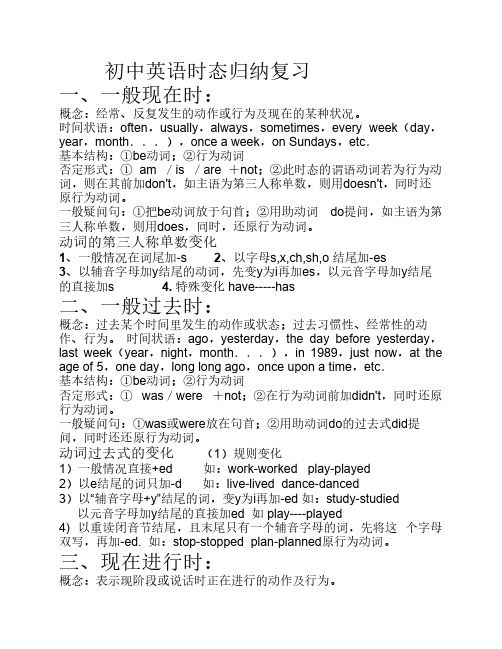
初中英语时态归纳复习一、一般现在时:概念:经常、反复发生的动作或行为及现在的某种状况。
时间状语:often,usually,always,sometimes,every week(day,year,month...),once a week,on Sundays,etc.基本结构:①be动词;②行为动词否定形式:①am /is /are +not;②此时态的谓语动词若为行为动词,则在其前加don't,如主语为第三人称单数,则用doesn't,同时还原行为动词。
一般疑问句:①把be动词放于句首;②用助动词do提问,如主语为第三人称单数,则用does,同时,还原行为动词。
动词的第三人称单数变化1、一般情况在词尾加-s2、以字母s,x,ch,sh,o 结尾加-es3、以辅音字母加y结尾的动词,先变y为i再加es,以元音字母加y结尾的直接加s 4.特殊变化 have-----has二、一般过去时:概念:过去某个时间里发生的动作或状态;过去习惯性、经常性的动作、行为。
时间状语:ago,yesterday,the day before yesterday,last week(year,night,month...),in 1989,just now,at the age of 5,one day,long long ago,once upon a time,etc.基本结构:①be动词;②行为动词否定形式:①was/were +not;②在行为动词前加didn't,同时还原行为动词。
一般疑问句:①was或were放在句首;②用助动词do的过去式did提问,同时还还原行为动词。
动词过去式的变化(1)规则变化1)一般情况直接+ed 如:work-worked play-played2)以e结尾的词只加-d 如:live-lived dance-danced3)以“辅音字母+y”结尾的词,变y为i再加-ed 如:study-studied 以元音字母加y结尾的直接加ed 如 play----played4) 以重读闭音节结尾,且末尾只有一个辅音字母的词,先将这个字母双写,再加-ed. 如:stop-stopped plan-planned原行为动词。
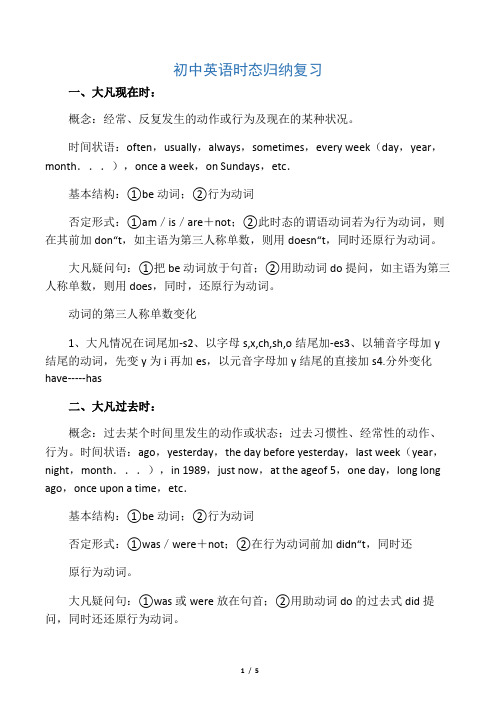
初中英语时态归纳复习一、大凡现在时:概念:经常、反复发生的动作或行为及现在的某种状况。
时间状语:often,usually,always,sometimes,every week(day,year,month...),once a week,on Sundays,etc.基本结构:①be动词;②行为动词否定形式:①am/is/are+not;②此时态的谓语动词若为行为动词,则在其前加don“t,如主语为第三人称单数,则用doesn“t,同时还原行为动词。
大凡疑问句:①把be动词放于句首;②用助动词do提问,如主语为第三人称单数,则用does,同时,还原行为动词。
动词的第三人称单数变化1、大凡情况在词尾加-s2、以字母s,x,ch,sh,o结尾加-es3、以辅音字母加y 结尾的动词,先变y为i再加es,以元音字母加y结尾的直接加s4.分外变化have-----has二、大凡过去时:概念:过去某个时间里发生的动作或状态;过去习惯性、经常性的动作、行为。
时间状语:ago,yesterday,the day before yesterday,last week(year,night,month...),in 1989,just now,at the ageof 5,one day,long long ago,once upon a time,etc.基本结构:①be动词;②行为动词否定形式:①was/were+not;②在行为动词前加didn“t,同时还原行为动词。
大凡疑问句:①was或were放在句首;②用助动词do的过去式did提问,同时还还原行为动词。
动词过去式的变化(1)规则变化1)大凡情况直接+ed如:work-workedplay-played2)以e结尾的词只加-d 如:live-liveddance-danced3)以“辅音字母+y”结尾的词,变y为i再加-ed如:study-studied以元音字母加y结尾的直接加ed如play----played4)以重读闭音节结尾,且末尾只有一个辅音字母的词,先将这个字母双写,再加-ed.如:stop-stoppedplan-planned原行为动词。

外研版初一英语下学期期末专题复习一、一般现在时:(1、现在的状态。
2、经常或习惯性动作。
3、主语所具备的性格和能力。
4、真理。
)1、标志:often(经常),usually(通常),sometimes(有时),always(总是),never(从不),on Sundays(在星期天), every day/month/year(每一天/月/年)2、结构:(1)主语+连系动词be(am/is/are)+名词/形容词/数词/介词短语/副词等做表语表状态(包括There be +n.)(2)主语(非第三人称单数)+行为动词原形+其他(用助动词do 帮助构成否定句、一般疑问句和特殊疑问)(3)主语(第三人称单数)+行为动词的第三人称单数+其他(用助动词does 帮助构成否定句、一般疑问句和特殊疑问句)行为动词第三人称单数加-s的形式1. - s2. 辅音+y: study-studies3. 以s,x,ch,sh结尾watch-watches teach-teaches 4.特殊have-has do-does go-goes练习1:用is、am或are填空1.China _________ a big country.2.We __________ in the classroom.3.Her mother _________ an English teacher.4.He ________ a worker. He works very hard.5.Where _________ you from?6.It _________ a beautiful cat.7.They _________ good friends.8.I ________ not from Jiangsu.I come from Shanghai.练习2. 用所给动词的正确形式填空。
1. Jim usually ________ ( have ) lunch at home.2. Li Guanhua _______ ( be ) twenty years old.3. How many students ________ ( be ) there in your class?4. ---______ she _______ ( study ) hard?---Yes, she _________.5. Lucy and lily _____________ ( not speak ) Chinese.6. My father ______________ ( not do ) morning exercises every day.7. She always ___________ ( wash ) her clothes on Sundays.8. ______ your brother ________ ( like ) playing football? No, he ____________.二.现在进行时:表示说话瞬间或现阶段正在进行的动作。
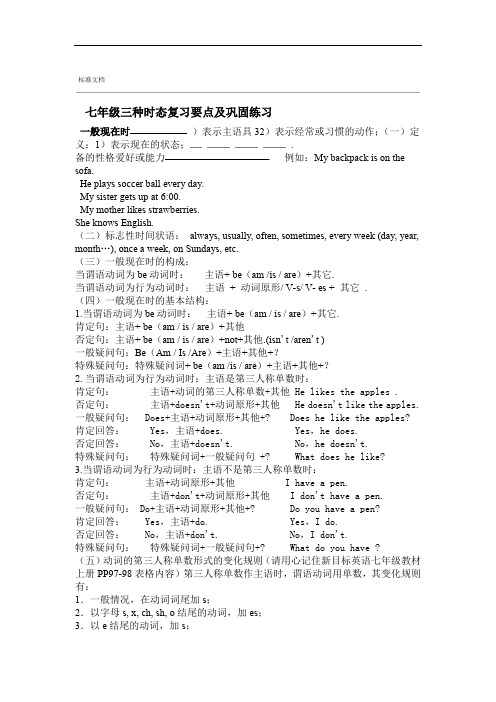
标准文档七年级三种时态复习要点及巩固练习一般现在时)表示主语具32)表示经常或习惯的动作;(一)定义:1)表示现在的状态;.备的性格爱好或能力例如:My backpack is on thesofa.He plays soccer ball every day.My sister gets up at 6:00.My mother likes strawberries.She knows English.(二)标志性时间状语:always, usually, often, sometimes, every week (day, year, month…), once a week, on Sundays, etc.(三)一般现在时的构成:当谓语动词为be动词时:主语+ be(am /is / are)+其它.当谓语动词为行为动词时:主语+ 动词原形/ V-s/ V- es + 其它.(四)一般现在时的基本结构:1.当谓语动词为be动词时:主语+ be(am / is / are)+其它.肯定句:主语+ be(am / is / are)+其他否定句:主语+ be(am / is / are)+not+其他.(isn't /aren't )一般疑问句:Be(Am / Is /Are)+主语+其他+?特殊疑问句:特殊疑问词+ be(am /is / are)+主语+其他+?2.当谓语动词为行为动词时:主语是第三人称单数时:肯定句:主语+动词的第三人称单数+其他 He likes the apples .否定句:主语+doesn't+动词原形+其他 He doesn't like the apples. 一般疑问句: Does+主语+动词原形+其他+? Does he like the apples?肯定回答: Yes,主语+does. Yes,he does.否定回答: No,主语+doesn't. No,he doesn't.特殊疑问句:特殊疑问词+一般疑问句 +? What does he like?3.当谓语动词为行为动词时:主语不是第三人称单数时:肯定句:主语+动词原形+其他 I have a pen.否定句:主语+don't+动词原形+其他 I don't have a pen.一般疑问句: Do+主语+动词原形+其他+? Do you have a pen?肯定回答: Yes,主语+do. Yes,I do.否定回答: No,主语+don't. No,I don't.特殊疑问句:特殊疑问词+一般疑问句+? What do you have ?(五)动词的第三人称单数形式的变化规则(请用心记住新目标英语七年级教材上册PP97-98表格内容)第三人称单数作主语时,谓语动词用单数,其变化规则有:1.一般情况,在动词词尾加s;2.以字母s, x, ch, sh, o结尾的动词,加es;3.以e结尾的动词,加s;4.以辅音字母加y结尾的动词,先变y为i,再加es5.以元音字母加y结尾的动词,加s;实用大全.标准文档6.特殊:have?has are?is现在进行时(一)定义:表示现在(说话瞬间)正在进行或发生的动作,也可表示当前一段时间内的活动或现阶段正在进行(二)标志性时间状语:now, listen! look! at this time, these days, etc.(三)构成: 主语+助动词be( am/ is / are / ) +动词-ing(现在分词)形式+其它。

七年级英语外研语法知识点在学习英语过程中,语法是一个非常重要的部分。
在七年级英语课程中,外研版教材涵盖了一些基础的语法知识点。
在本文中,我们将详细介绍这些知识点,以帮助学生更好地掌握英语语法。
一、一般现在时一般现在时是英语中最常见的时态之一,用来描述经常性的动作或状态。
例如:“I play basketball every Sunday”(我每个星期天打篮球)。
一般现在时的构成:主语 + 动词原形(第三人称单数要在动词后加“s”)。
例如:“He plays basketball every Sunday”(他每个星期天打篮球)。
二、一般过去时一般过去时用于描述过去发生的事情。
例如:“Yesterday, Iwent to the zoo”(昨天,我去了动物园)。
一般过去时的构成:主语 + 动词过去式。
例如:“I played basketball yesterday”(我昨天打篮球了)。
三、一般将来时一般将来时用于描述将来的动作或事件。
例如:“I will go to Beijing next week”(下个星期我将去北京)。
一般将来时的构成:主语 + will + 动词原形。
例如:“She will study English tonight”(她今晚要学英语)。
四、现在进行时现在进行时表示正在进行的动作。
例如:“I am watching television now”(我正在看电视)。
现在进行时的构成:主语 + am/is/are + 动词-ing。
例如:“She is studying Chinese now”(她正在学汉语)。
五、过去进行时过去进行时表示在过去某个时间正在进行的动作。
例如:“I was reading a book when my friend called me”(当我的朋友给我打电话的时候,我正在看书)。
过去进行时的构成:主语 + was/were + 动词-ing。

七年级外研知识点作为初中阶段的开端,七年级的学习内容涵盖了语文、数学、英语、物理、化学、生物等多个科目。
其中,外语学习是七年级学生最为重视的一个科目,其知识点也是学习外语的关键。
本文将从外研社出版教材的角度,为大家总结七年级英语知识点。
一、语法1. 一般现在时一般现在时是英语学习的最基础也是最重要的时态之一,用于表示现在正在进行或者说是经常性的动作。
在句子中形式为:主语 + 动词原形 / 第三人称单数动词 + 其他。
例如:- I often play football in the park.- He listens to music every day.2. 一般过去时一般过去时是表示过去发生的事情,用于描述一个已完成或者已经结束的动作或状态。
在句子中形式为:主语 + 动词过去式 + 其他。
例如:- She visited her grandparents last weekend.- They watched a movie yesterday.3. 现在进行时现在进行时是用于描述现在正在发生并且还未完成的动作。
在句子中形式为:主语 + am / is / are + doing + 其他。
例如:- I am playing basketball with my classmates now.- They are chatting online at the moment.4. 一般将来时一般将来时表示将要发生的动作或者状态。
在句子中形式为:主语 + will + 动词原形 + 其他。
例如:- We will go shopping tomorrow.- He will have a party next week.二、句型1. There be 句型There be 句型是指从句子一开始就有一个主语,用于表示某个地方、某个环境或者某个场所中有或者没有某些事物。
在句子中结构为:There is / are + 名词 + 其他。

外研版七年级时态复习一般现在时1. 一般现在时的定义一般现在时表示经常的、习惯性的动作或存在的状态。
2.和一般现在时连用的时间状语一般现在时常与以下时间状语联用:always, usually, often, sometimes, seldom,every week (day, year, month…), once a week, on Sundays, twice…3. 一般现在时的构成(1)be型:由be动词(am,is或are)+名词、形容词、副词、代词、数词或介词短语等一起构成谓语,表示主语的个性、特征或状态。
a.肯定句 Eg. I am a student.我是一名学生。
b.否定句,在be后面加not。
Eg. She isn't a teacher.她不是教师。
c.一般疑问句,将be放在句首。
Eg. --Are you ready? --Yes, I am./No, I'm not.(2)情态动词型:a.肯定句中情态动词后跟动词原形。
Eg.He can play the piano.b.否定句,在情态动词后面加not。
Eg. He can’t play the piano.c.一般疑问句,将情态动词放在句首。
Eg. --Can you play the piano?--Yes, I can./No, I can’t.(3)实义动词型:句中的谓语动词为实义动词(也叫行为动词)a. 当主语不是第三人称单数时(包括you/I在内的所有复数)肯定句:They have lessons in the morning.否定句(在动词前加don’t):They don’t have lessons in the morning.一般疑问句(在句首加Do):--Do they have lessons in the morning?--Yes, they do./No, they don’t.b. 当主语是第三人称单数时(除了you/I之外的所有单数)肯定句(动词需加-s或-es):He likes vegetables.否定句(在动词前加doesn’t,并将动词还原成原形:He doesn't like vegetables.一般疑问句(在句首加Does,并将动词还原成原形):--Does he like vegetables? --Yes, he does.(--No, he doesn't.)4.注意一般现在时可表示客观真理,客观存在,科学事实,必须用一般现在时。

外研版初一英语时态专题复习Rewritten:Topic: Review of Simple Present Tense in EnglishSimple XXX present states。
habitual ns。
personality traits。
XXX indicated by adverbs such as often。
usually。
sometimes。
always。
never。
on Sundays。
and every day/month/year.The structure of Simple Present Tense can be divided into three types。
The first one is subject + linking verb be (am/is/are) + XXX。
which expresses a state (including There be + n.)。
The second one is subject (non-third person singular) + base form of verb + others (using auxiliary verb do to form negative sentences。
general ns。
and special ns)。
The third one is subject (third person singular) + third person singular form of verb + others (using auxiliary verb does to form negative sentences。
general ns。
and special ns)。
The third person singular form of verbs usually adds -s。
but there are ns such as adding -es to verbs ending in s。

1.外研版初一英语下学期期末专题复习一、一般现在时:〔1、现在的状态。
2、经常或习惯性动作。
3、主语所具备的性格和能力。
4、真理。
〕1、标志:often〔经常〕,usually〔通常〕,sometimes〔有时〕,always〔总是〕,never〔从不〕,onSundays〔在星期天〕,everyday/month/year〔每一天/月/年〕2、结构:1〕主语+连系动词be(am/is/are)+名词/形容词/数词/介词短语/副词等做表语表状态〔包括Therebe+n.〕〔2〕主语〔非第三人称单数〕+行为动词原形+其他〔用助动词do帮助构成否认句、一般疑问句和特殊疑问〕〔3〕主语〔第三人称单数〕+行为动词的第三人称单数+其他〔用助动词does帮助构成否定句、一般疑问句和特殊疑问句〕行为动词第三人称单数加-s的形式1.-s2.辅音+y:study-studies3.以s,x,ch,sh结尾watch-watches teach-teaches4.特殊have-hasdo-doesgo-goes练习1:用is、am或are填空China_________abigcountry.We__________intheclassroom.Hermother_________anEnglishteacher.He________aworker.Heworksveryhard.Where_________youfrom?It_________abeautifulcat.They_________goodfriends.I________notfromJiangsu.IcomefromShanghai.练习2.用所给动词的正确形式填空。
Jimusually________(have)lunchathome.LiGuanhua_______(be)twentyyearsold.Howmanystudents________(be)thereinyourclass?---______she_______(study)hard?---Yes,she_________.Lucyandlily_____________(notspeak)Chinese.Myfather______________(notdo)morningexerciseseveryday.Shealways___________(wash)herclothesonSundays.______yourbrother________(like)playingfootball?No,he____________.二.在行:表示瞬或段正在行的作。
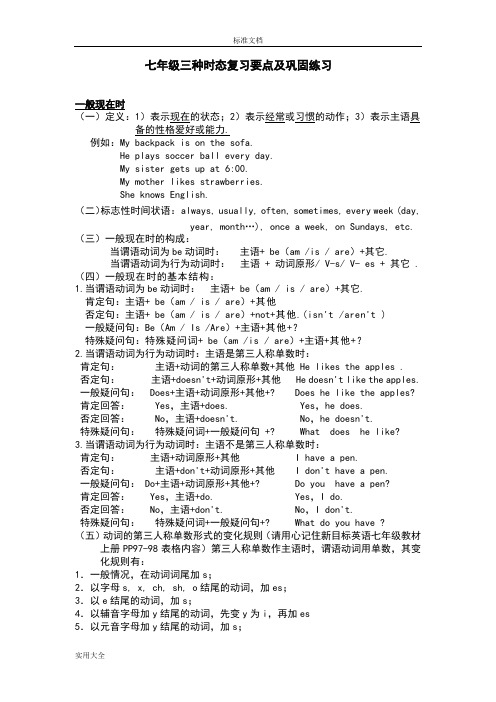
七年级三种时态复习要点及巩固练习一般现在时(一)定义:1)表示现在的状态;2)表示经常或习惯的动作;3)表示主语具备的性格爱好或能力.例如:My backpack is on the sofa.He plays soccer ball every day.My sister gets up at 6:00.My mother likes strawberries.She knows English.(二)标志性时间状语: always, usually, often, sometimes, every week (day,year, month…), once a week, on Sundays, etc. (三)一般现在时的构成:当谓语动词为be动词时:主语+ be(am /is / are)+其它.当谓语动词为行为动词时:主语 + 动词原形/ V-s/ V- es + 其它 . (四)一般现在时的基本结构:1.当谓语动词为be动词时:主语+ be(am / is / are)+其它.肯定句:主语+ be(am / is / are)+其他否定句:主语+ be(am / is / are)+not+其他.(isn't /aren't )一般疑问句:Be(Am / Is /Are)+主语+其他+?特殊疑问句:特殊疑问词+ be(am /is / are)+主语+其他+?2.当谓语动词为行为动词时:主语是第三人称单数时:肯定句:主语+动词的第三人称单数+其他 He likes the apples .否定句:主语+doesn't+动词原形+其他 He doesn't like the apples. 一般疑问句: Does+主语+动词原形+其他+? Does he like the apples? 肯定回答: Yes,主语+does. Yes,he does.否定回答: No,主语+doesn't. No,he doesn't.特殊疑问句:特殊疑问词+一般疑问句 +? What does he like?3.当谓语动词为行为动词时:主语不是第三人称单数时:肯定句:主语+动词原形+其他 I have a pen.否定句:主语+don't+动词原形+其他 I don't have a pen.一般疑问句: Do+主语+动词原形+其他+? Do you have a pen?肯定回答: Yes,主语+do. Yes,I do.否定回答: No,主语+don't. No,I don't.特殊疑问句:特殊疑问词+一般疑问句+? What do you have ?(五)动词的第三人称单数形式的变化规则(请用心记住新目标英语七年级教材上册PP97-98表格内容)第三人称单数作主语时,谓语动词用单数,其变化规则有:1.一般情况,在动词词尾加s;2.以字母s, x, ch, sh, o结尾的动词,加es;3.以e结尾的动词,加s;4.以辅音字母加y结尾的动词,先变y为i,再加es5.以元音字母加y结尾的动词,加s;6.特殊:have→has are→is现在进行时(一)定义:表示现在(说话瞬间)正在进行或发生的动作,也可表示当前一段时间内的活动或现阶段正在进行(二)标志性时间状语:now, listen! look! at this time, these days, etc. (三)构成: 主语+助动词be( am/ is / are / ) +动词-ing(现在分词)形式+其它。
外研版初一英语下学期期末专题复习一、一般现在时:(1、现在的状态。
2、经常或习惯性动作。
3、主语所具备的性格和能力。
4、真理。
)1、标志:often(经常),usually(通常),sometimes(有时),always(总是),never(从不), on Sundays(在星期天), every day/month/year(每一天/月/年)2、结构:(1)主语+连系动词be(am/is/are)+名词/形容词/数词/介词短语/副词等做表语表状态(包括There be +n.)(2)主语(非第三人称单数)+行为动词原形+其他(用助动词do 帮助构成否定句、一般疑问句和特殊疑问)(3)主语(第三人称单数)+行为动词的第三人称单数+其他(用助动词does 帮助构成否定句、一般疑问句和特殊疑问句)行为动词第三人称单数加-s的形式1. - s2. 辅音+y: study-studies3. 以s,x,ch,sh结尾watch-watches teach-teaches 4.特殊have-has do-does go-goes练习1:用is、 am或 are填空1. China _________ a big country.2. We __________ in the classroom.3. Her mother _________ an English teacher.4. He ________ a worker. He works very hard.5. Where _________ you from?6. It _________ a beautiful cat.7. They _________ good friends.8. I ________ not from Jiangsu. I come from Shanghai.练习2. 用所给动词的正确形式填空。
1. Jim usually ________ ( have ) lunch at home.2. Li Guanhua _______ ( be ) twenty years old.3. How many students ________ ( be ) there in your class?4. ---______ she _______ ( study ) hard?---Yes, she _________.5. Lucy and lily _____________ ( not speak ) Chinese.6. My father ______________ ( not do ) morning exercises every day.7. She always ___________ ( wash ) her clothes on Sundays.8. ______ your brother ________ ( like ) playing football? No, he ____________.二.现在进行时:表示说话瞬间或现阶段正在进行的动作。
1、标志: now(现在)listen(看)look(听)2、结构:主语+助动词be(am/is/are)+行为动词的现在分词(doing)现在分词的构成:1.-ing: eat-eating (直接加)2.辅音字母+e: take-taking (去e加)3. sit, put, begin, run, swim, stop, get, shop,(双写加)练习:1. Jim __________________(take) photos in the park now.2.Jim_________(not take) in the park now.3. _______________Jim____________(take) photos in the park now?Yes, he _____. No, he _______.4. Where _________Jim ____________ photos now?In the park.三.一般过去时:表示过去某个时间里发生的动作或状态;过去习惯性、经常性的动作、行为;过去主语所具备的能力和性格。
标志:一段时间+ago,yesterday(句子开头或结尾),the day before yesterday, last week, last(year,night,month…),具体时间(如Jan.fourth),just now, one day, long ago, once upon a time(很久以前)动词变化规则:规则变化:1.直接加ed:work—— worked look——looked play——played,2.以e结尾的单词,直接加d:live ——lived hope——hoped use——used,3. 以辅音字母+y结尾的,变y为i加ed:study—— studied carry——carried worry ——worried,4.以元音字母+y结尾的,直接加ed:enjoy ——enjoyed play——played5.以重读闭音节结尾的,双写最后的辅音字母+ed:stop—— stopped plan——planned 不规则变化:见教材120页结构:肯定:主语+动词过去式+其他否定:①was/were+not;②在行为动词前加didn't,同时还原行为动词主语+ 其他?改写句子:1、Lucy did her homework at home.(改否定句)Lucy _______ _______ her homework at home.2、He found some meat in the fridge.(变一般疑问句)______ he _____ ______ meat in the fridge?3、She stayed there for a week.(对划线部分提问)______ ______ _____ she _____ there?4、There was some orange in the cup.(变一般疑问句)_____ there _____ orange in the cup?四.一般将来时:表示将来的动作、状态等。
标志:tomorrow, next week/month /year, in a few days等。
结构:(will+动词原形 be going to+动词原形)第一类肯定句主语+shall/will+动词原形+其它成分.否定句主语+shall/ will +not +动词原形+其它成分.一般疑问句:Shall /will +主语+动词原形+其它成分?特殊疑问句疑问词+shall/will+主语+动词原形+其它成分?如:What will they do next Saturday?注:shall用于第一人称。
will用于各种人称。
口语中常用will代替shall。
shall not=shan’t will not=won’t第二类is/am/are going to + V(原形)表示将来的构成形式:肯定句主语+ is/am/are going to +动词原形+其它成分.否定句主语+ is/am/are +not+ going to +动词原形+其它成分一般疑问句: is/am/are +主语+going to +动词原形+其它成分?特殊疑问句疑问词+ is/am/are +主语+going to +动词原形+(其它成分)?注意:Be(am / is /are)随着主语的变化而变化。
Be (am / is /are) going to + V(原形)表示将来的用法。
用动词一般将来时态填空:1. We _____ _____(hike) next Sunday.2. I ____ ____(do) it tomorrow.3. My father ____ ______(come) back next week.4. Why _____ you______(not climb) the hill with us next Saturday?5. ____she ____(see) her aunt soon?6. Where ____they ______(move) next month?7. ____ you_____(help) me with my English tonight.五、情态动词:1、任何主语+can/may/must+动词原形2、主语+ can’t/may not/ mustn’t+动词原形3、Can/May/Must + 主语+ 动词原形?4、疑问词+can/may/must+主语+动词原形?六、非谓语动词(是固定搭配)1. like+ to do不定式/doing动名词2.want to do sth.3. love to do4. wouldlike to do sth.5. enjoy doing sth.6. thanks for doing7. stop doing sth8. let sb. do sth.She wants _____(have) a party. Does he like _______(swim)?Thanks for _______(enjoy) CCTV show. She never stops ____(talk).七.祈使句:Go straight and turn left/ right.Go through Fifth Avenue.Take a taxi(Take a bus,Take a walk……)八.综合练习11.Mr Green _____(be) a worker. Now he ____(work) in the field.2.Listen! Who_______(sing)?3.What time ____ your brother usually _____(do) his homework?4.You can_______(come) here by bus.5. Who ____(have) a ruler?6.Are they_____(clean) the room?7.-____ you____(eat) dinner? – Yes, we are.8.Jack ____(have) a soccer ball, but he ____(not have) a basketball.9._______Jim _______(like)______(run)?10.They _____(be) from Canada. They______(not speak) Chinese.11. He wants _________________(be) tall.练习21) I__________(be)a student. My sister______ (be)a student, too.2) There______(be)a pen and two pencils in the pencil-box.3) Listen! She _________ (sing) a song.4) We always ________ (clean)our classroom after school.5) There _______ many clouds in the sky. It ___________________rain soon.6) Sometimes we______ (play) football after school. We really_____ (enjoy)ourselves7) They _________ (go) to Guangzhou for a meeting.8) We know there _______(be) 24 hours in a day.9) All the students_____ ______ (have) computer lessons now?10) ______ you _______ ( go ) to school by bus next Friday?11) What ______ your mother_______ (do)?12) Don't be late, Joan. The train__________ (start)at 10a.m.13) My parents usually______ (watch) TV on Saturday evening.14) He often ________ (listen) to the radio at home.15) We_______ ________(not have) much work to do today.16) When_____ your music lesson______ (begin)?17) Why ______ you ______ (not go ) by train?18) ______ ( be ) you _________ have a music class tomorrow?练习3.1.我们正在吃晚餐。